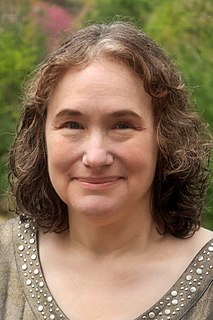A Quote by Jennifer Egan
Her only thought was of getting away, as if she were carrying a live grenade from inside the house, so that when it exploded, it would destroy just herself.
Related Quotes
Yet there were times when he did love her with all the kindness she demanded, and how was she to know what were those times? Alone she raged against his cheerfulness and put herself at the mercy of her own love and longed to be free of it because it made her less than he and dependent on him. But how could she be free of chains she had put upon herself? Her soul was all tempest. The dreams she had once had of her life were dead. She was in prison in the house. And yet who was her jailer except herself?
She realized how many of her beliefs were either unrealistic or belonged to her deceased parents and her ex-husband. She also realized that her expectations for herself and others were sometimes too rigid. She was trying to live up to what everyone else said was best for her, which made her depressed and hard to be around at times. Once she changed her beliefs about herself and others, she began to smile more and enjoy life.
Perhaps I will die too, she told herself, and the thought did not seem so terrible to her. If she flung herself from the window, she could put an end to her suffering, and in the years to come the singers would write songs of her grief. Her body would lie on the stones below, broken and innocent, shaming all those who had betrayed her. Sansa went so far as to cross the bedchamber and throw open the shutters ... but then her courage left her, and she ran back to her bed, sobbing.
Sometimes she wished for someone she could tell about her problems, just to be able to say, ‘I’m in love with a man and I can’t have him.’ But that would only lead to questions she couldn’t answer, so she kept the secret and the pain inside, hoping someday she would no longer feel as if half of her were missing.
This was something she would keep hidden within herself, maybe in place of the knot of pain and anger she had been carrying under her breastbone...a security blanket, an ace up her sleeve. She might never use it, but she would always feel its presence like a swelling secret stone, and that way when she let go of the rage, she would not feel nearly as empty.
There was a warmth of fury in his last phrases. He meant she loved him more than he her. Perhaps he could not love her. Perhaps she had not in herself that which he wanted. It was the deepest motive of her soul, this self-mistrust. It was so deep she dared neither realise nor acknowledge. Perhaps she was deficient. Like an infinitely subtle shame, it kept her always back. If it were so, she would do without him. She would never let herself want him. She would merely see.
In the US. Infantry Manual published during World War II, the soldier was told what to do if a live grenade fell into the trench where he and others were sitting: to wrap himself around the grenade so as to at least save the others. (If no one "volunteered," all would be killed, and there were only a few seconds to decide who would be the hero.)
It seemed to Alabama that, reaching her goal, she would drive the devils that had driven her - that, in proving herself, she would achieve that peace which she imagined went only in surety of one’s self - that she would be able, through the medium of the dance, to command her emotions, to summon love or pity or happiness at will, having provided a channel through which they might flow. She drove herself mercilessly, and the summer dragged on.
Claire found herself staring at his feet, which were in bunny slippers. Myrnin looked down. "What?" he asked. "They're quite comfortable." He lifted on to look at it, and the ears wobbled in the air. "Of course they are," she said. Just when she thought Myrnin was getting his mental act together, he'd do something like that. Or maybe he was just messing with her. He liked to do that, and his dark eyes were fixed on her now, assessing just how weirded-out she was. Which, on the grade scale of zero to Myrnin, wasn't much.
She looked so beautiful in the moonlight, but it wasn't only the way she looked, it was what was inside her, everything from her intelligence and courage to her wit, and the special smile she gave only to him. He would slay a dragon, if there were such a thing, just to see that smile. He knew he would never want anyone else for as long as he lived. He would rather spend the rest of his life alone than with someone else. There could be no one else.
She stared at herself in the mirror. Her eyes were dark, almost black, filled with pain. She'd let someone do that to her. She'd known all along she felt things too deeply. She became attached. She didn't want a lover who could walk away from her, because she could never do that - love someone completely and survive intact if her left her.
She thought of the hardness and the coldness she had cultivated over those years and wondered if they were the mask she wore or if the mask had become her self. If the longing inside her for kindness, for warmth, for compassion, was the last seed of hope for her, she didn't know how to nurture it or if it could live.






































